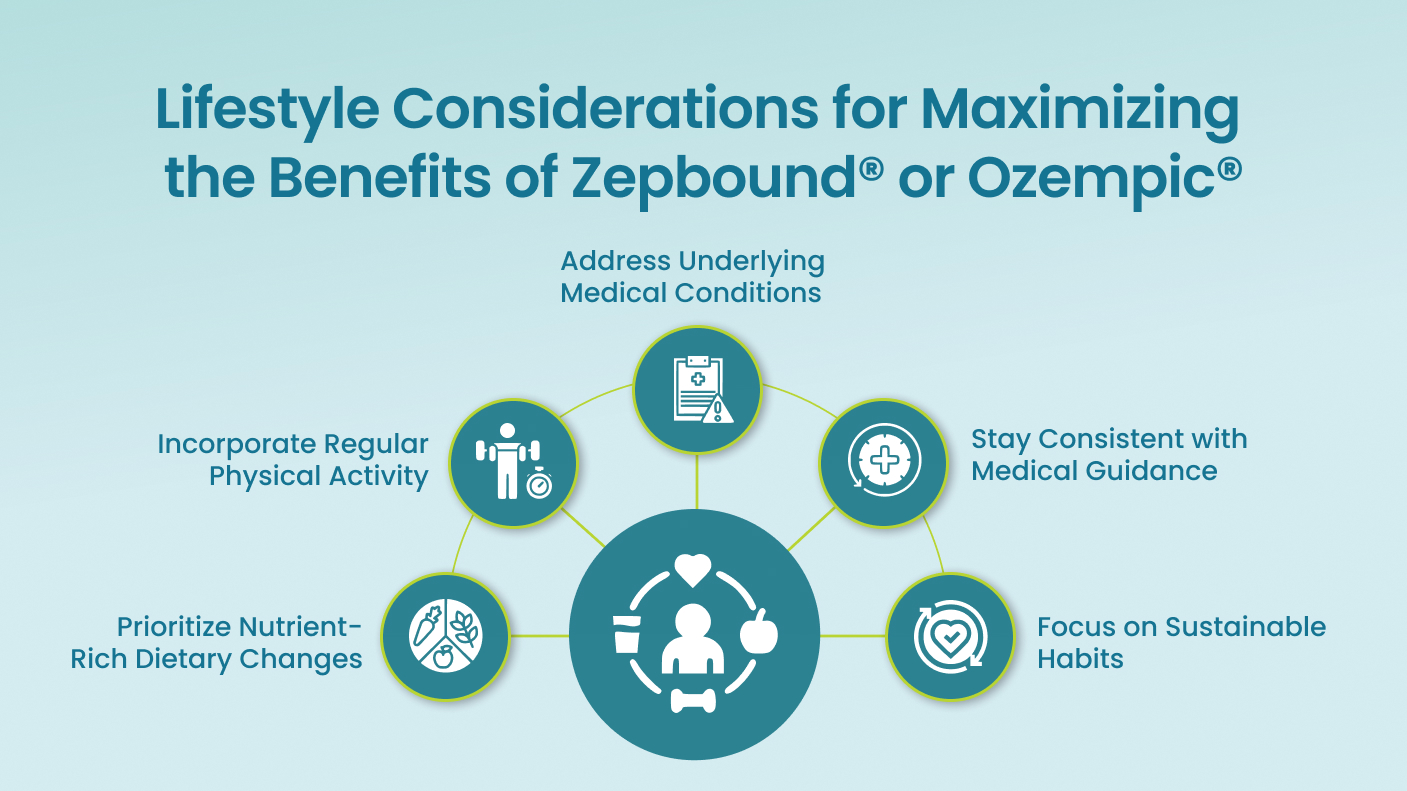
Zepbound® vs Ozempic® for Weight Loss: What You Need to Know
If you’re on a weight loss journey or considering starting one, terms like liposuction and tummy tuck may have already caught your attention. While these treatments are widely accessible and deliver quick results, they often fall short in sustainability. The body can easily revert to its previous state without addressing underlying factors. Achieving long-term weight management requires more than physical sculpting—it calls for solutions like semaglutide or tirzepatide.
Medications like Zepbound® and Ozempic® offer a science-backed weight loss approach that delivers results and ensures they last. Plus, these treatments are often covered by health insurance, making them an affordable and practical choice for many. So, why wait? If sustainable weight loss is your goal and you’re considering Zepbound® or Ozempic®, now is the perfect time to explore your options.
Nevertheless, we understand that exploring these choices can feel overwhelming. That’s why we’ve put together this comprehensive guide to help you better understand these transformative treatments. From their effectiveness and safety to costs and lifestyle recommendations, this guide provides everything you need to make an informed, confident decision. Let’s get started!
Zepbound® vs. Ozempic®: Understanding Their Role in Weight Management and Diabetes Control
Zepbound® and Ozempic® have emerged as two leading GLP-1 receptor agonists for weight management and Type 2 diabetes. While their mechanisms are similar, each offers unique features.
Zepbound®: A New Era of Innovation
Zepbound® is a drug similar to semaglutide (Ozempic®), a GLP-1 receptor agonist that aids weight management and Type 2 diabetes control. What sets it apart is its advanced formulation, which may combine the benefits of appetite regulation, enhanced satiety, and improved blood sugar levels. Although its primary indication is diabetes management, it has demonstrated promising off-label results for weight loss, making it a versatile choice for those seeking sustainable solutions.
Ozempic®: A Trusted Market Leader
Ozempic® is a well-established GLP-1 receptor agonist initially developed to manage Type 2 diabetes. Its proven ability to suppress appetite and slow digestion has made it popular for achieving steady weight loss. With the FDA’s approval of its higher-dose formulation, Wegovy®, specifically for weight management, Ozempic® has solidified its position as a trusted option for individuals looking to shed extra pounds while maintaining blood sugar control. Ozempic® has earned its reputation as a reliable choice for weight management and blood sugar control. Learn more about its role in diabetes management and how it benefits overall health in our comprehensive breakdown: How Does Ozempic® (Semaglutide) Work for Diabetes: Mechanism and Benefits Explained.
How They Work: Mechanisms of Action
Both Zepbound® and Ozempic® operate by mimicking the GLP-1 hormone, which is crucial in regulating appetite and blood sugar levels. However, Zepbound® potentially offers a dual-action mechanism, targeting additional pathways that enhance hunger suppression and promote weight loss more effectively. Ozempic®, on the other hand, focuses exclusively on GLP-1 receptors, delivering effective appetite control and gradual weight reduction.
Both medications also improve insulin sensitivity and slow gastric emptying, helping individuals feel full longer. These combined mechanisms reduce calorie intake, support better blood sugar management, and contribute to sustainable weight loss.
Efficacy: How Effective Are They for Weight Loss?
Zepbound® has shown exceptional results in clinical trials, with participants achieving up to 20% body weight reduction combined with lifestyle modifications. Its dual-action approach appears to contribute to these impressive outcomes.
Ozempic® also delivers significant weight loss, with studies reporting an average of 15-20% reductions in body weight. While it may not match the percentage achieved with Zepbound®, its proven track record and broad acceptance make it a strong contender for those seeking steady and reliable results.
Side Effects & Safety: Zepbound® vs Ozempic®
While Zepbound® and Ozempic® are effective tools for weight management and Type 2 diabetes, understanding their side effects is crucial for informed decision-making.
Serious Side Effects
- Stomach Problems: Severe or persistent stomach issues have been reported. Consult your doctor if symptoms don’t improve.
- Pancreatitis: Both medications may cause inflammation of the pancreas, characterized by severe abdominal pain radiating to the back, with or without vomiting. Immediate medical attention is essential.
- Kidney Problems: Dehydration due to nausea, diarrhea, or vomiting can lead to kidney issues. Staying hydrated is crucial to minimizing this risk.
- Gallbladder Issues: Symptoms like abdominal pain, fever, jaundice, or clay-colored stools may indicate gallbladder problems. Contact your healthcare provider promptly.
- Low Blood Sugar (Hypoglycemia): More likely when combined with insulin or sulfonylureas, presenting symptoms like dizziness, sweating, shakiness, and blurred vision.
- Serious Allergic Reactions: Discontinue use if you experience swelling, breathing difficulty, severe rash, or rapid heartbeat, and seek immediate medical help.
- Vision Changes: Any changes in vision during treatment should be reported to your doctor.
- Mental Health Concerns: Monitor for mood changes or suicidal thoughts and consult a healthcare provider if needed.
- Surgical Risks: Both medications may increase the chance of food or liquid entering the lungs during anesthesia or sedation. Inform your healthcare team before any procedure.
Common Side Effects: Zepbound® and Ozempic® share common side effects such as nausea, diarrhea, constipation, abdominal pain, vomiting, and fatigue. Zepbound® may also cause hair loss, belching, and heartburn, while Ozempic® has a simpler side effect profile. These effects are generally mild but should be discussed with your doctor if persistent or bothersome.
By understanding these risks and consulting your healthcare provider, you can safely integrate these medications into your journey toward sustainable weight management.
Dosage and Administration
Zepbound® typically starts at 2.5 mg weekly, with gradual adjustments to meet individual goals and minimize side effects. The medication is administered via subcutaneous injection, and pens require refrigeration, though they can temporarily be stored at room temperature. Ozempic® begins at a lower dose of 0.25 mg weekly, gradually increasing to 1 mg or higher depending on treatment plans. Its storage requirements and administration process mirror those of Zepbound®, making them equally convenient.
Cost Comparison
Zepbound®’s pricing ranges from $1,000 to $1,200 without insurance, though savings programs may help offset costs. As a newer medication, its coverage options may be more limited. Ozempic® typically costs between $850 and $1,000 without insurance, but with broader coverage and better savings programs available, its longer presence on the market gives it an edge in affordability for many users. While Zepbound® and Ozempic® differ in cost and coverage, Ozempic® has broader insurance support. Wondering if your plan covers it? Find out in our guide on Ozempic® and insurance coverage.
Suitability and Situational Recommendations
Zepbound® is ideal for individuals seeking maximum weight loss results and willing to invest in a newer, potentially more robust solution. Its dual-action mechanism may appeal to those without success with single-action medications. Ozempic® is a reliable choice for a cost-effective, consistent solution with proven efficacy. Its accessibility and extensive insurance coverage make it a practical option for long-term use.
In the next section, we’ll learn more about how making little changes in your life can further help improve your weight loss results.
Lifestyle Considerations for Maximizing the Benefits of Zepbound® or Ozempic®

While Zepbound® and Ozempic® are transformative medications for weight management and Type 2 diabetes, their true potential is unlocked when paired with healthy lifestyle habits. Here’s a detailed look at the lifestyle considerations to enhance their effectiveness:
1. Prioritize Nutrient-Rich Dietary Changes
- To complement the appetite-regulating effects of these medications, adopt a balanced diet rich in lean proteins, healthy fats, whole grains, and vegetables.
- Minimize processed foods, sugary beverages, and high-calorie snacks, as they can counteract the progress achieved with Zepbound® or Ozempic®.
- Focus on portion control and mindful eating practices to develop sustainable, long-term habits that align with weight loss goals.
2. Incorporate Regular Physical Activity
- Engage in cardiovascular exercises (e.g., walking, jogging, cycling) and strength training to boost metabolism and improve overall health.
- Health experts recommend 150 minutes of moderate-intensity weekly exercise to support weight loss and improve insulin sensitivity.
- Physical activity enhances the medication’s effectiveness and helps maintain weight loss results over time.
3. Address Underlying Medical Conditions
- Conditions like Type 2 diabetes, hormonal imbalances, or gastrointestinal issues can impact weight management. Ensure these are effectively managed to optimize the benefits of the medication.
- Work closely with a healthcare provider to tailor a treatment plan considering these factors, ensuring a holistic approach to weight loss.
4. Stay Consistent with Medical Guidance
- Adhere to the prescribed dosage and schedule for Zepbound® or Ozempic® to maintain steady progress.
- Consult your healthcare provider regularly to monitor your progress, adjust medication, and address potential side effects.
5. Focus on Sustainable Habits
- Remember that medications are tools, not standalone solutions. Lasting weight loss requires building healthy habits that fit seamlessly into your lifestyle.
- Celebrate small milestones and progress to stay motivated and maintain long-term success.
By integrating these lifestyle changes with the use of Zepbound® or Ozempic®, you can maximize their benefits, achieve sustainable weight management, and improve overall well-being. Nevertheless, always consult your healthcare provider for personalized advice tailored to your unique health profile.
Zepbound® and Ozempic® offer compelling solutions for weight loss, each with unique strengths and considerations. Zepbound® may provide superior results for those aiming for substantial weight loss, while Ozempic® offers a trusted, cost-effective option with a well-established track record.
We hope we answered your questions about both medications. But if you still have lingering questions, we hope the following FAQs can help.
Frequently Asked Questions
- How effective is Zepbound® for weight loss?
Zepbound® has shown significant results in clinical trials, with participants losing up to 20% of their body weight combined with a healthy diet and lifestyle. Individual outcomes may vary depending on adherence to the treatment plan and other factors like metabolism and medical history.
- Is Ozempic® the same as Zepbound®?
No, Ozempic® and Zepbound® are not the same. Both medications belong to the GLP-1 receptor agonist class but differ in formulations and action mechanisms. Zepbound® may include additional pathways that enhance its efficacy, while Ozempic® focuses solely on GLP-1 receptors.
- What is better than Ozempic® for weight loss?
Medications like Zepbound® have demonstrated superior weight loss results in clinical trials, making them a strong alternative for those seeking substantial weight reduction. However, the “better” option depends on individual health goals, medical history, and how well the medication is tolerated. Consulting a healthcare provider is essential for choosing the best option.
- How much weight can I lose on Zepbound®?
Participants in clinical studies have reported losing up to 20% of their body weight with Zepbound® when combined with lifestyle modifications. Actual results can vary based on factors like dosage, duration of treatment, and adherence to a prescribed regimen.
- Can I use Zepbound® if I’ve already tried Ozempic®?
Yes, Zepbound® can be an option for those who have used Ozempic® but are looking for enhanced results or a different weight-loss approach. However, a healthcare provider should guide any switch between medications to ensure safety and effectiveness.
Finally, the best choice depends on your health goals, financial situation, and tolerance for potential side effects. Consulting your healthcare provider is essential to making an informed decision that aligns with your needs. Furthermore, whichever you choose, either Zepbound® or Ozempic®, these medications can be instrumental in your journey toward better health. Moreover, if you have decided to proceed with Ozempic®, we at IV Drips are ready to assist you.
Experience Sustained Weight Loss with IV Drips
Ready to transform your health with semaglutide treatments like Ozempic® and Wegovy®? At IV Drips, we offer personalized weight loss programs developed to help you achieve your wellness goals with expert medical support.
Our dedicated team creates customized dosage plans, provides ongoing follow-ups, and ensures hassle-free delivery of your medications to your doorstep. We also provide tailored dietary recommendations and wellness strategies to promote lasting results. With semaglutide programs starting at just $475, there’s no better time to take charge of your health.
Contact us today to discover how Ozempic® or Wegovy® can help you on your weight loss journey!
Posted on behalf of IVDrips










